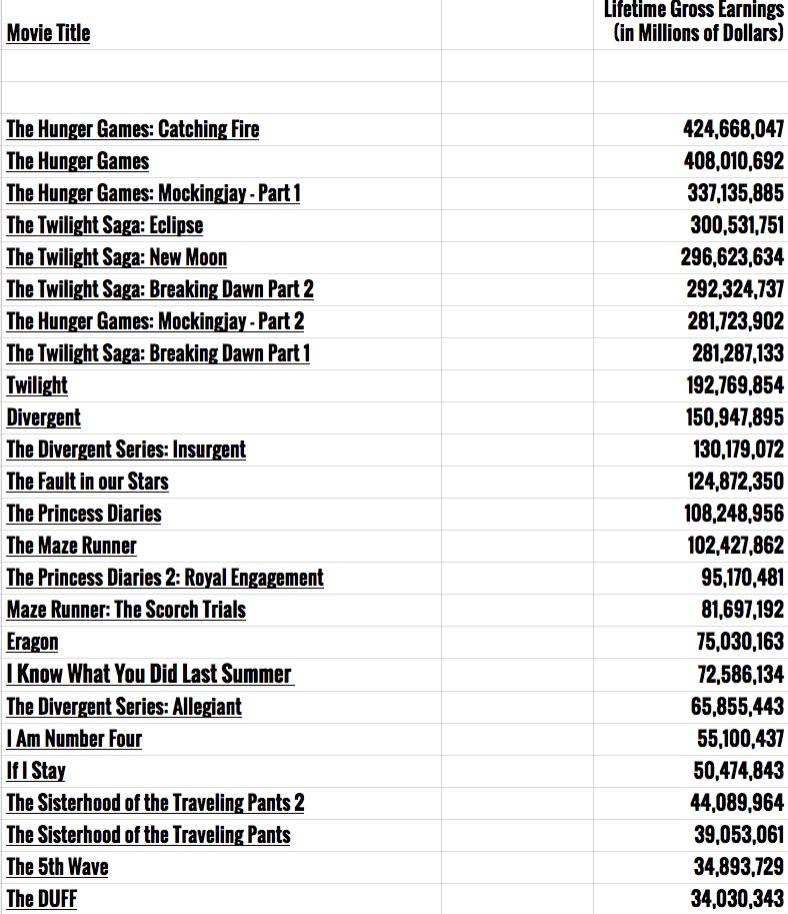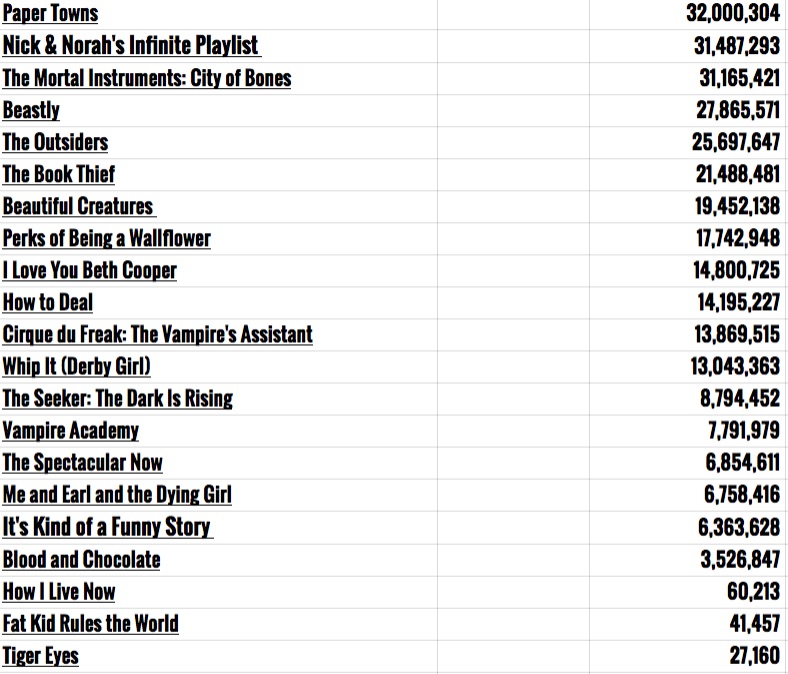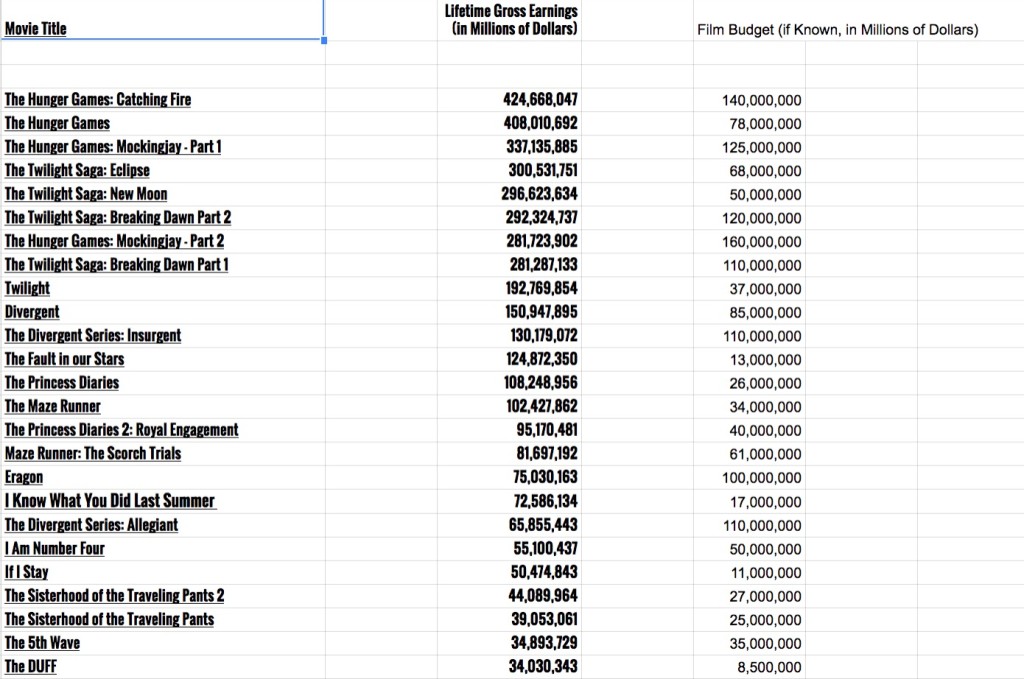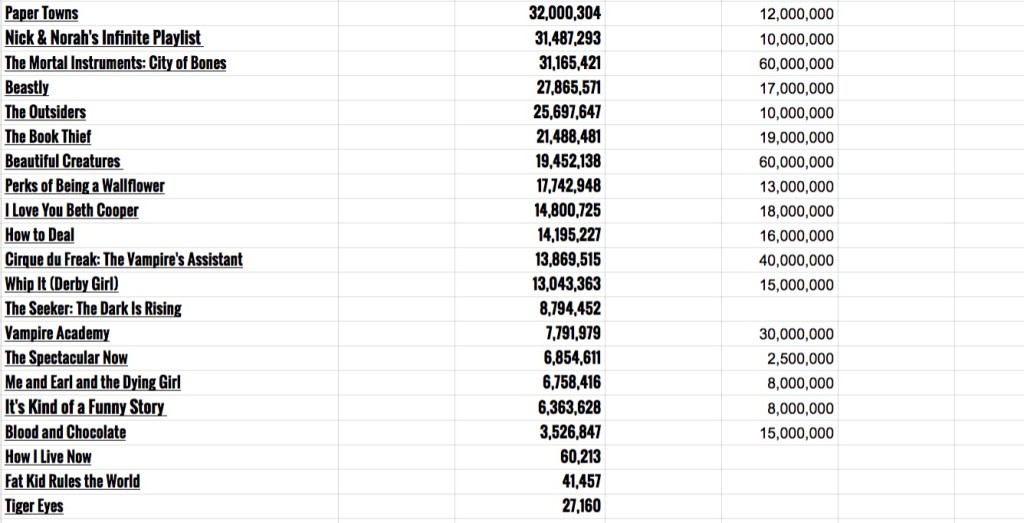Hello, YA lovers!
 This week’s newsletter is sponsored by Genius by Leopoldo Gout, from Feiwel & Friends, an imprint of Macmillan.
This week’s newsletter is sponsored by Genius by Leopoldo Gout, from Feiwel & Friends, an imprint of Macmillan.
Get ready to run! Three teen geniuses from around the world compete in a game with the highest of stakes. Together, they seek to win the game and change the world, but it won’t be easy. . . “Genius is exciting, provocative, fresh, innovative, and smart, smart, smart.” —James Patterson
Let’s talk about book-to-film adaptations this week.
It seems like every week, I collect tons of links to the latest YA books that are being optioned for film. Optioned, for those who aren’t down on the language, means that interest has been expressed for making a film, but it’s not a guarantee. Until the film is on the big screen (or on DVD if it’s a straight-to-DVD deal), nothing in the film world is a guarantee. But, an option means that there’s money on the line and someone has the rights to make the film, which is in itself a pretty big thing.
This piece from The Hollywood Reporter caught my attention, particularly the first couple of lines:
With the Hunger Games franchise wrapped up, foreign buyers are ravenous for new young adult adaptations that could potentially launch a franchise. A slew of projects have invaded the market in Cannes this year, offering fantasy and supernatural tales involving witches, ghosts and dystopian-set drama.
Where it almost feels like YA adaptations in the US are slowing down in terms of the box office returns, foreign companies are looking to find more potential places to build a franchise or two to make money. And more specifically, filmmakers are looking to tap into that young female audience (which is funny, given that CBS claimed the Nancy Drew television series was “too female” for their audiences). More from the Hollywood Reporter piece:
While the success of Twilight and The Hunger Games has made the YA genre a box-office force especially at drawing in the young female audience — there have been several films sold at markets that didn’t have the same happy ending […] ‘People who lost money on the YA pictures that came after Twilight were because they went crazy on the budgets,’ says Lisa Wilson, co-founder and partner of The Solution Entertainment Group.
So, what sorts of returns are YA box office titles seeing, anyway? With the help of Box Office Mojo, I compiled a handy little spreadsheet of YA books made into films and compiled their Lifetime Gross Earnings (LGE). LGE takes the money brought in by the films from their premiere to the present, which in this case, would be May 15, 2016. The LGE does not take into account what the film’s budget was, and in this data, LGE is for domestic earnings. This isn’t a comprehensive list of all YA book-to-film adaptations, and I’ve purposefully left out Harry Potter, since the first films are middle grade skewed, Ender’s Game, which was originally an adult novel with YA crossover appeal, and other titles that many call YA but that really are not.
These are films that came out between 1980 and today and it won’t surprise me if many of these adaptations are a surprise (in other words, you may not have known these were adapted from YA books). If you need these bigger, click and they should expand:


I don’t want to talk too much about what any of this means, if anything, but what I do think is worth observing are a few things:
- Female-led YA adaptations seem to make a lot of money.
- Female-written YA books seem to make adaptations that make a lot of money.
- The first film in a franchise seems to make less money than subsequent films, which makes some sense — once a film has done well, it raises the profile and encourages more people to get into the franchise.
- These films are so, so white.
Now let’s make this a little bit more interesting and see what, if anything, can be said about what sorts of earnings were made against the budget of these films. I’ve pulled the estimated budgets from Wikipedia, and in instances where a range was offered, I pulled the highest number. Not all of these films have budgets listed, but the biggies — the ones that Wilson is talking about in the THR article — do. Can’t read these? Here’s a read-only spreadsheet with the numbers.


In terms of my observations above, about later films in a franchise having bigger earnings than the earlier titles, perhaps it has to do with bigger budgets and more marketing.
Likewise, perhaps those bigger and bigger budgets explain why some adaptations, like the third installment in the Divergent series or the recently-released (with little to no buzz) The Fifth Wave earned very little comparatively. Big budgets don’t always mean success.
There aren’t any real conclusions to be drawn with these numbers; rather, this is an interesting data-driven way to look at the whys and hows of the growth in YA adaptations on the big screen. Though they aren’t always a success, they do bring in the money . . . and female audiences. (Worth sharing here this piece from last year about why it is we hate on the things girls love, even though girls have money to spend and often set the trends).
It’s only fitting now to share some more adaptation news from the last couple of weeks:
- Salla Simukka’s “Snow White” trilogy, which is an in-translation series out of Norway, is headed for the big screen. I got my hands on the first in this trilogy and couldn’t seem to get the rest from my local library, but now I want to. It has a Girl with the Dragon Tattoo vibe to it, but it’s through the female POV. Fresh thriller-y stuff for the YA world, so hopefully this will make the books more widely available.
- The first trailer for the adaptation of Jeanne Ryan’s debut novel Nerve has landed. I didn’t know this book was getting a film adaptation, and I didn’t know it had Emma Roberts in it.
- Aime Kaufman and Meagan Spooner’s book These Broken Stars, which is the first in a science fiction series, is being looked at for television adaptation with Freeform (formerly ABC Family).
- I’m bummed to learn that Freeform’s adaptation of Recovery Road isn’t being picked up for a second season. It was a wonderfully diverse realistic show — I wonder if that’s why it didn’t do so hot?
- The Possibility of Fireflies is being eyed by Courtney Love, along with others, for adaptation. Never heard of the book? Me either. It published in 2006, and the story itself is set in the 1980s.
- Alexandra Monir’s The Final Six has a movie deal. Never heard of it? Well, you won’t be alone — the book isn’t finished and doesn’t even have a publishing deal yet. (If this is the point where you’re wondering when the craze will stop, you won’t be alone, either).
- There’s been a casting announcement for the adaptation of Carrie Ryan’s The Forest of Hands and Teeth. I’m here for this one.
- And finally in adaptation talk — at least for this newsletter edition! — the television rights to Dawn Kurtagich’s The Dead House have been acquired. It’s unclear whether this will be something possible to see in the US or if it’ll be just in the UK. Of course, it has to be filmed first. . .
To round out this edition of “This Week in YA,” here are some non-adaptation news and links worth reading or knowing about this week. I could probably talk in depth about most of them, and maybe I will in future newsletters:
- KIDDING, more adaptation news to launch this final section of news — but this is in the form of The Selection becoming a coloring book.
- Fran Wilde’s YA novel Updraft won a Nebula Award.
- This year’s Audio award winner in YA is Libba Bray’s The Lair of Dreams. You can check out a sample on the Audies website.
- Speaking of audiobooks, I know I’ve shared this before, but now that it’s going on, it’s time to share again: each week, all summer long, you can download two audiobooks per week for free through Sync. There are YA titles and classic titles and the selections are excellent. You can’t beat free.
- In the last YA newsletter, I wrote about cover designs. Sarvenaz Tash just wrote a behind-the-scenes post about the cover for her upcoming book, The Geek’s Guide to Unrequited Love. Check it out (includes cover models, makeup, clothing, the Javitz Center, and more).
- Finally, a look at some of the trends — micro and macro — in YA literature, as seen and discussed at Book Expo America.
Thanks for tuning in to another edition of “What’s Up in YA?” Keep on being rad and keep on reading — and spoiler: I think it’ll be time to give away some books soon.